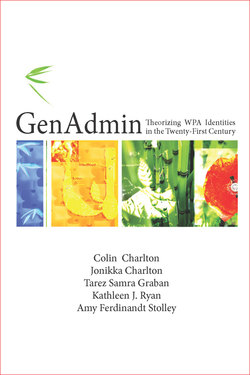Читать книгу GenAdmin - Colin Charlton - Страница 8
На сайте Литреса книга снята с продажи.
ОглавлениеAcknowledgments
We are indebted to many people on the completion of this book. We would specifically like to thank our Parlor Press publisher, David Blakesley, our reviewers, and the WPA series editors Susan McLeod and Margot Soven, who were quick to respond to the idea of this book and who made the process smooth from start to finish. Nancy DeJoy gave us formative, substantive suggestions for revision, and Dana Anderson, Christine Farris, Joan Linton, and John Schilb each read portions of the earliest draft that helped shape our thinking. A 2008 research grant, awarded for The Assemblage Project, from the Council of Writing Program Administrators allowed us to gather and index other WPAs’ stories and to rethink how those stories can be circulated and retold.
We also thank those individuals who encouraged us as we wrote, in small and large ways, and who gave us reason to believe in this project’s exigence and audiences. Collectively, we are indebted to the participants at our “GenAdmin: Making Sense of/for a New Generation of Writing Program Administrators” session during the 2008 CWPA Conference in Denver. The crosstalk that occurred during and after that session has shaped the final version of this book in more ways than one. For the years they invested in our well-being—personally and professionally, either in the classroom or as colleagues in a dynamic discipline—we are also indebted to Shirley K Rose, Irwin Weiser, Janice Lauer, Thomas Rickert, Dick Fulkerson, and Donna Dunbar-Odom, whose commitment to rhetorical traditions, past and present, has influenced each of us and impacted this book. For the less obvious, sometimes implicit, ways they interacted with us, tracked our careers, provided opportunities to collaborate, modeled for us the kinds of intellectual engagers we hoped to become, or challenged (sometimes chastened) us throughout this project, we thank Linda Adler-Kassner, Joe Janangelo, Marty Townsend, Thomas Miller, Hephzibah Roskelly, Kate Ronald, and Elizabeth Chiseri Strater. We thank Jeanne Gunner, Joe Harris, Dennis Lynch, and Martha Townsend for their dialogic thinking about our book, for offering us responses, reactions, and feedback as we drafted it, and for beginning the conversation we hoped that it would. And we thank this book’s readers—for taking on the task of thinking philosophically about writing program administration in an institutional climate that may not explicitly invite it, for not succumbing to the weariness that clouds all we do, and for recognizing that we do not struggle against depictions of the job or of our institutions, but rather struggle with them. Our need for becoming among today’s contingencies seems ever more pressing.
Finally, we mention important personal debts. Jonikka and Colin would like to thank Moriah McCracken, Larry Dambreville, Robert Reitz, Shoney Flores, Theron Francis, Gary Schneider, Kyoung Lee, the Coles, Dalel Serda, Bonnie Garcia, Valerie Oritz, Brittany Ramirez, Jordan Guerra, and Sharon Fulkerson for reminding them that there can be joy in their work and in their play. Tarez would like to thank Pat Sullivan and Shirely Rose for modeling—in her generosity, perseverance, and patience—a work ethic that drives most of Tarez’s collaborations, at Indiana University and elsewhere. Amy would like to thank her colleagues at Saint Xavier who have given her an institutional home that is far more homey than institutional; they’ve graciously made space for her to ask questions about writing and generously supported her efforts to find answers. Kate would like to thank Rebecca Jones, Deb Dew, Beth Howells, Amy Ratto Parks, Nancy Cook, Bruce Ballenger, Janet Bean, Kelly Webster, Doug Downs, and Duane Roen for valuing writing program administration and believing in her commitment to and capacity for doing that work.
